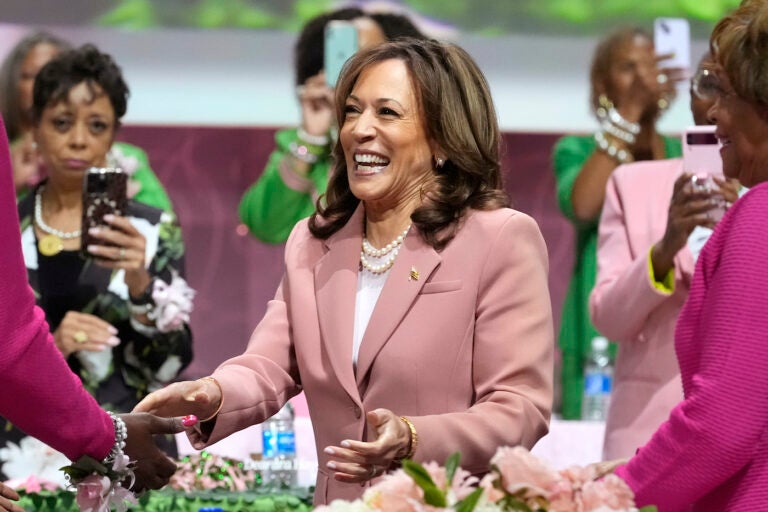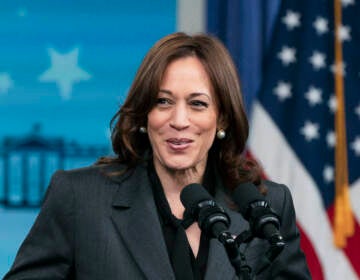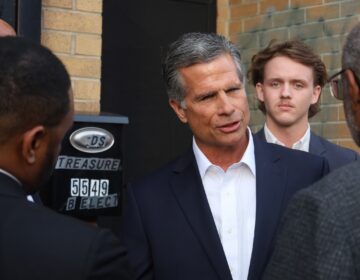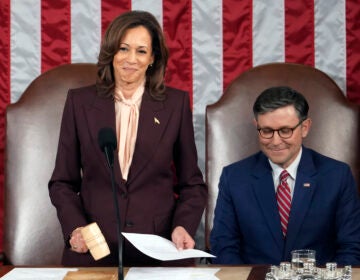‘We were built for this moment’: Black women rally around Kamala Harris
On Sunday night, an estimated 90,000 Black women and allies logged on to Zoom at the same time to support her brand-new presidential campaign.

FILE - Vice President Kamala Harris speaks at the Alpha Kappa Alpha Sorority Inc. annual convention during the 71st biennial Boule at the Kay Bailey Hutchison Convention Center in Dallas, Wednesday, July 10, 2024. The #WinWithBlackWomen network says more than 40,000 Black women joined a Zoom call to support Harris on Sunday, July 21, hours after Biden ended his reelection campaign and endorsed Harris, and that the meeting was streamed to another 50,000 via other platforms. (AP Photo/LM Otero, File)
Four years ago, a Zoom meeting to build support for Kamala Harris as the Democratic vice presidential nominee attracted just 90 participants. On Sunday night, an estimated 90,000 Black women and allies logged on at the same time to support her brand-new presidential campaign.
Zoom typically maxes out at 1,000 participants but a female executive at the video conferencing company stepped in to increase the capacity to 40,000, said Aimee Allison, who has attended many of the weekly calls organized by the #WinWithBlackWomen network over the years. And organizers said the meeting was streamed to another 50,000 women on other platforms.
“It was thrilling,” Allison said. “It wasn’t chaos. The infrastructure was there amongst Black women to be able to scale and meet the moment. And I think this is the difference-maker Kamala Harris is injecting into the race.”
The discussion just hours after President Joe Biden announced the end of his reelection campaign and endorsement of Harris had the feel of a revival meeting, said Allison, who founded “She the People” to advocate for women of color in politics in 2018. Woman after woman described in detail what needs to be done before Election Day while also celebrating one of their own.
“We’re together. We’re beautiful, we’re strong, we’re capable. We’re ready. We have incredible power in this group,” she said. “People just were so hungry for that community and for that feeling of hope.”
On Monday night, a “Black Men for Harris” online streaming event co-hosted by #WinWithBlackMen, a similar networking group for Black men, drew tens of thousands who pledged to support Harris, and featured speeches from Black male leaders from elected offices, in the civil rights community and business. More than 53,000 people had registered for the call, according to Roland Martin, a Black media leader who moderated the virtual event.
Black voters in general, and women in particular, were key to Biden’s victories in both the 2020 primaries and general election. While Donald Trump had a modest advantage among white women, Biden won overwhelmingly among Black women, 93% to Trump’s 6%, according to AP VoteCast, a survey of more than 110,000 voters.
Just last week, more than 1,300 Black female leaders and allies published a letter supporting Biden and Harris. But if Sunday and Monday’s calls are any indication, they’re now all-in for Harris, who is of Black and Indian descent.
“This wasn’t just policy people or legislative people or elected officials. This was across the board. Everybody came with their toolbox and was like, okay, so how do we pitch in?” said Angelique Roche, a writer and consultant who described the call as powerful and galvanizing.
“These were different generations with different education levels, different jobs, different backgrounds, different industries, all coming to the table and saying, we’re ready, we’re in,” she said.
Earlier this month, Harris herself extolled “the power of sisterhood and service” when she addressed the annual gathering of Alpha Kappa Alpha Sorority, which she joined as a student at Howard University, one of the nation’s most storied historically Black colleges.
“Our nation is counting on the leaders in this room to guide us forward,” she told the crowd of Black women, some shaking pompoms to cheer her on. “When we mobilize, nations change. And when we vote, we make history.”
Gemeem Davis, a Democratic convention delegate from Bridgeport, Connecticut, echoed that sentiment Monday.
“Black women have really been the backbone of the Democratic Party. We show up. We vote. We volunteer. We register people to vote, there’s lots of organizing on the ground,” she said.
“Along with working class folks and progressives, we are the base of this party, and our voices have to be heard.”
Harris, Davis said, is qualified and ready to be president. But other Black female voters expressed concerns about her ability to win should she become the nominee. Brianna Smith, a 24-year-old school counselor from Decatur, Georgia, said she’s been reading more about Harris since Biden’s announcement and has been impressed. But she remains nervous.
“I don’t see America actually accepting the fact that a Black woman is running for president,” she said.
While Harris’ path to the potential nomination may be unusual, Harris herself “is not a unicorn” who sprang out of nowhere and is unprepared for this moment, said Martha Jones, author of a book about Black women in American political history. Rather, she has learned from those who came before her.
“A part of her political identity is a kind of nimbleness and a kind of adaptability,” said Jones, a history professor at Johns Hopkins University.
Likewise, many Black women are already pivoting to help Harris, said Glynda Car, president of Higher Heights, an organization that bills itself as a “political home for Black women.”
“We were built for this moment,” she said.
Allison, the “She the People” founder, agreed.
“We didn’t have to get ready, because we stay ready,” she said.
____
Associated Press writers Matt Brown in Atlanta and Sue Haigh in Hartford, Connecticut, contributed to this report.

Get daily updates from WHYY News!
WHYY is your source for fact-based, in-depth journalism and information. As a nonprofit organization, we rely on financial support from readers like you. Please give today.





